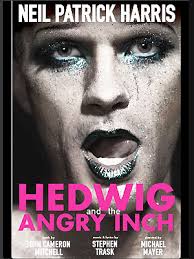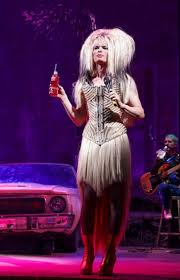How to Be...A big wig, Hedwig.
Hedwig and the Angry Inch opens on Broadway tonight. New York City and Broadway is all a-twitter with glitter.
Not me.
I saw the show twice in previews and after the first time, I was happy to brush off what I saw with “preview” explanations and excuses. They were still working out kinks, figuring out what worked, tweaking, etc. etc.
But after the second time it dawned on me that it wasn’t the fabricated jokes and dumbed-down material that bothered me, but the fact that they weren’t telling the goddamn story.
It’s a fantastic movie if you haven’t seen it. It’s a great rock musical to see live, if you can. The show is heartbreaking, relevant, honest and important. I think in light of all the current human rights and equal rights campaigns it’s a story that we could all afford to hear right now.
But they didn’t fucking tell it.
A year ago, when the announcement was made that Neil Patrick Harris was to play the powerhouse character of Hedwig, a transgender German “rock-star,” I was cautiously thrilled.
Tyler Coates mirrored my cautious optimism in his FlavorWire article examining the choice to cast Harris as Hedwig and stating “perhaps Harris’ involvement will give the show a bait-and-switch appeal; expecting the feel-good comic efforts of his typical work, the audience will then get a one-two punch of identity politics.”
That was my hope as well. Having seen a gorgeous production at the Jungle Theatre in Minneapolis as well as the John Cameron Mitchell masterpiece of a movie numerous times, I knew that Hedwig was not typical Broadway fare. It had great acclaim off-Broadway, winning awards and running for two years, but the 2014 Harris-as-Hedwig was the first production in a Broadway house. This show was born in the underground drag/punk/rock scene of NYC and quickly became a cult classic. It ain’t My Fair Lady.
But they had opportunity to give Broadway Hedwig, whether you like it or not, with material that would simultaneously make audience-goers squirm in their seats but also bridge a greater understanding of the universality of pain, love, connection and disconnection regardless of gender, sexual identity and preferences.
There was an opportunity here to not only address identity politics, as Coates states, but to tell a non-heterosexual love story and “push forth the less mainstream and straight-friendly elements of the non-heterosexual world: the grit, the pain, the sex, the anger” (Coates)
I’ll admit, I really hoped that this show would be a game-changer with the overwhelming commercialism of Broadway. To shake up the very literal great white way, and reach beyond the typical Broadway audience population to the people who need to hear a story that sounds like their own, that acknowledges a sub-culture or people who’ve largely been ignored or turned cartoonish in theatre so as not to upset mainstream audience-goers.
I sometimes worry we’ve forgotten what theatre is supposed to do. To connect, to alienate, to teach, to challenge, to inspire, to give, receive and to reassure. But the sad truth is unless you venture off-Broadway, for the most part all you’re going to find are million-dollar musicals, non-musicals that require celebrity names to sell tickets, huge musical numbers, great stunts, millions of dollars worth of spectacle, but NO story. Or a story that’s been so weakened and politically corrected that it loses any and all chance at impact.
It seems with all the elaborate sets, costumes, stunts, spectacles and effects that there’s no room left on stage anymore for story. And unfortunately, that’s what happened to Hedwig.
What this current production has is Neil Patrick Harris in concert. Singing the songs from the cult classic Hedwig and doing a very admirable, athletic job but doing it with little or no regard to the heart of the story. The directors, or producers or powers that be have done a great disservice to the amazing musicians standing in the background and the immensely talented Lena Hall who plays Hedwig’s husband, Yitzak and Neil Patrick Harris. It’s not Harris’s lack of chops or ability, as far as I’m concerned—-this is a directorial/producer decision. This is not John Cameron Mitchell and Stephen Trask’s Hedwig and the Angry Inch, but Broadway’s watered-down version.
Unless you’ve seen a production or the movie, (and frankly even if you have) it’s often very difficult to piece together the story they occasionally reference. The heartbreaking relationship between Yitzak and Hedwig is largely ignored, and in fact is often brushed aside with forced jokes or gags—it seems that the fear of realistically representing a non-heterosexual relationship is so great that they have to pepper any references with comedic noise.
The relationship between Hedwig and Tommy (the boy who Hedwig believed to be her soul mate who leaves her and becomes a rock star off the material they wrote together) is referenced most simply because of Cameron & Trask’s text and lyrics, but again it appears Harris is hesitant to get too real in regard to the heartbreak Hedwig endures at Tommy’s hands, or at the botched sex change operation that he was forced to have in order to be married and leave Berlin. Just when we get a glimpse of genuine sadness over loss of identity or love or connection, they revert to anger and comedy instead of cutting deep into the heart of the story and taking the audience with them.
They don’t deal with the pain of being ripped in two, be it your heart, your identity or your relationship. There's no acknowledgement of the pain of being in a relationship with someone who uses you and strips you of your identity. One of the show's songs, "Freaks" is not surprisingly missing from this production. To me this kind of says it all, this anthem of "other-ness" being deliberately excluded, protecting audiences from lines like "I know this guy who can suck his own dick, And my mother has a friend who has three tits." For a society that accepts a stunning amount of violence and gratuitous heterosexual sex from Hollywood, it would seem we don't want to see it in front of us onstage, at least not on Broadway.
They skim the heartbreak of unrequited love and the loss of a soul mate, and while the effects behind the massively gorgeous love song, “Origin of Love” are stunning, I lost the meaning of the very powerful song that speaks to the connection we all seek with each other, with ourselves and in the world. As an audience we're so busy being enthralled by special effects that we're robbed of the connection we could feel to the song, to the story, to the character's pain.
Regardless of the state of Broadway today, I realized recently that I’m angry about this production not just because I feel like they bastardized a show that can stand on its own because of a great story and score, but because I think it’s socially irresponsible to stage such a show and then walk away from the opportunity to connect, teach and challenge and inspire change.
The show doesn’t break down walls to reach out to the misfits and losers and show them that they pain down in your soul was the same as the one down in mine, and it most certainly doesn’t show this wicked little town something beautiful and new.
This show gives the audience about an inch of story and that makes me angry.



